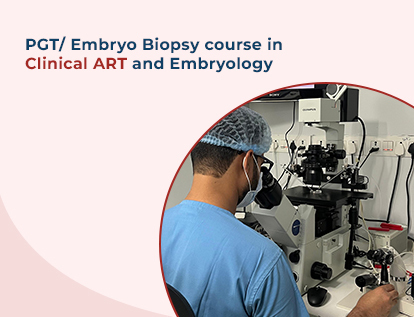
Embryo Biopsy is a technique through which the Genetic Status of the Embryo can be identified and thus improve the chance of establishing a healthy Pregnancy. It can give the information about
Ploidy status (whether the Embryo is Euploid-normal or aneuploid-abnormal) through PGT-A
Monogenic Disorder (any known Parental Carrier Disorder or Familial Disorder) through PGT-M
Structural Rearrangements (Inversions, Reciprocal Translocation, Robertsonian Translocation) through PGT-SR
This procedure can be carried out on either day 3 or day 5 of the Embryo development. Preferably it is carried out on day 5 (Blastocyst Stage) when the Embryo has grown large enough to have hundreds of cells. Waiting until this stage allows for several cells to be removed without harming the embryo, which increases the accuracy of genetic testing.
The embryo biopsy is carried out with the help of a Laser. First, there is a hole made in the zona pellucida of the Embryo and then a few cells of the trophectoderm are carefully taken without harming the Embryo. These cells are then sent to the Genetic Laboratory for the appropriate Genetic Test to be done.
The Embryos are then frozen until the IVF laboratory awaits the result from the Genetic Laboratory.
This course will provide different techniques, steps, preparation and tips for Embryo Biopsy as well as non-invasive genetic testing.
This involves analyzing embryos for genetic abnormalities before implantation.
It provides insights into the genetic competency of embryos.
Involves embryo biopsy using micromanipulation.
A small sample of cells is removed from the embryo for genetic analysis.
Analyzes the spent culture medium in which the embryo has been growing.
Does not require direct manipulation of the embryo.
These techniques are crucial in identifying genetic disorders or chromosomal abnormalities in embryos before they are transferred to the uterus during in vitro fertilization (IVF) procedures. This can help increase the chances of a successful pregnancy and reduce the risk of genetic disorders in offspring.


Ploidy status (whether the Embryo is Euploid-normal or aneuploid-abnormal) through PGT-A
Monogenic Disorder (any known Parental Carrier Disorder or Familial Disorder) through PGT-M
Structural Rearrangements (Inversions, Reciprocal Translocation, Robertsonian Translocation) through PGT-SR
Post Graduate in Clinical Embryology
Post Graduate in Life science, Microbiology, and Biotechnology
Ph.D. in Embryology/Assisted reproduction/ Infertility
MBBS/BVSC with post-graduation in Clinical Embryology
Yuvaraj Sinh Thakore
Senior Clinical Embryologist
Copyright 2024. All Rights Reserved Motherhood Training Center
Designed and Devloped By fleek.media